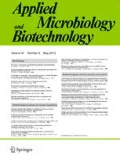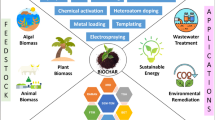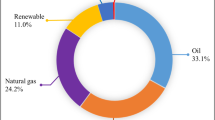Abstract
Biomass plastics are expected to contribute to the establishment of a carbon-neutral society by replacing conventional plastics derived from petroleum. The biomass-derived aromatic amine 4-aminocinnamic acid (4ACA) produced by recombinant bacteria is applied to the synthesis of high-performance biopolymers such as polyamides and polyimides. Here, we developed a microbial catalyst that hydrogenates the α,β-unsaturated carboxylic acid of 4ACA to generate 4-aminohydrocinnamic acid (4AHCA). The ability of 10 microbial genes for enoate and xenobiotic reductases expressed in Escherichia coli to convert 4ACA to 4AHCA was assessed. A strain producing 2-enoate reductase from Clostridium acetobutylicum (ca2ENR) reduced 4ACA to 4AHCA with a yield of > 95% mol mol−1 and reaction rates of 3.4 ± 0.4 and 4.4 ± 0.6 mM h−1 OD600 −1 at the optimum pH of 7.0 under aerobic and anaerobic conditions, respectively. This recombinant strain reduced caffeic, cinnamic, coumaric, and 4-nitrocinnamic acids to their corresponding propanoic acid derivatives. We polycondensed 4AHCA generated from biomass-derived 4ACA by dehydration under a catalyst to form high-molecular-weight poly(4AHCA) with a molecular weight of M n = 1.94 MDa. This polyamide had high thermal properties as indicated by a 10% reduction in weight at a temperature of T d10 = 394 °C and a glass transition temperature of T g = 240 °C. Poly(4AHCA) derived from biomass is stable at high temperatures and could be applicable to the production of high-performance engineering plastics.






Similar content being viewed by others
References
Bechthold I, Bretz K, Kabasci S, Kopitzky R, Springer A (2008) Succinic acid: a new platform chemical for biobased polymers from renewable resources. Chem Eng Technol 31(5):647–654. https://doi.org/10.1002/ceat.200800063
Blehert DS, Fox BG, Chambliss GH (1999) Cloning and sequence analysis of two Pseudomonas flavoprotein xenobiotic reductases. J Bacteriol 181(20):6254–6263
Buschke N, Schröder H, Wittmann C (2011) Metabolic engineering of Corynebacterium glutamicum for production of 1,5-diaminopentane from hemicellulose. Biotechnol J 6(3):306–317. https://doi.org/10.1002/biot.201000304
Caldeira J, Feicht R, White H, Teixeira M, Moura JJG, Simon H, Moura I (1996) EPR and Mössbauer spectroscopic studies on enoate reductase. J Biol Chem 271(31):18743–18748. https://doi.org/10.1074/jbc.271.31.18743
Chaparro-Riggers JF, Rogers TA, Vazquez-Figueroa E, Polizzi KM, Bommarius AS (2007) Comparison of three enoate reductases and their potential use for biotransformations. Adv Synth Catal 349(8-9):1521–1531. https://doi.org/10.1002/adsc.200700074
Deng Y, Ma L, Mao Y (2016) Biological production of adipic acid from renewable substrates: current and future methods. Biochem Eng J 105:16–26. https://doi.org/10.1016/j.bej.2015.08.015
Dym O, Eisenberg D (2001) Sequence-structure analysis of FAD-containing proteins. Protein Sci 10(9):1712–1728. https://doi.org/10.1110/ps.12801
Garcia JM, Garcia FC, Serna F, de la Pena JL (2010) High-performance aromatic polyamides. Prog Polym Sci 35(5):623–686. https://doi.org/10.1016/j.progpolymsci.2009.09.002
Hubbard PA, Liang X, Schulz H, Kim J-JP (2003) The crystal structure and reaction mechanism of Escherichia coli 2,4-dienoyl-CoA reductase. J Biol Chem 278(39):37553–37560. https://doi.org/10.1074/jbc.M304642200
Hunter GJ, Hunter T (2013) GroESL protects superoxide dismutase (SOD)—deficient cells against oxidative stress and is a chaperone for SOD. Health (Irvine Calif) 5(10):1719–1729. https://doi.org/10.4236/health.2013.510232
Kern A, Tilley E, Hunter IS, Legiša M, Glieder A (2007) Engineering primary metabolic pathways of industrial micro-organisms. J Biotechnol 129(1):6–29. https://doi.org/10.1016/j.jbiotec.2006.11.021
Masuo S, Zhou S, Kaneko T, Takaya N (2016) Bacterial fermentation platform for producing artificial aromatic amines. Sci Rep 6(1):25764. https://doi.org/10.1038/srep25764
Natarajan J, Rattan S, Singh U, Madras G, Chatterjee K (2014) Polyanhydrides of castor oil–sebacic acid for controlled release applications. Ind Eng Chem Res 53(19):7891–7901. https://doi.org/10.1021/ie500679u
Rohdich F, Wiese A, Feicht R, Simon H, Bacher A (2001) Enoate reductases of Clostridia: cloning, sequencing, and expression. J Biol Chem 276(8):5779–5787. https://doi.org/10.1074/jbc.M008656200
Sánchez CO, Díaz FR, Gatica N, Bustos C, Espiñeira K, Huaquimilla D (2011) Synthesis and study of the effect of carboxyvinyl group position on the properties of polyamides. Crosslinked polymers. Polym Bull 67(1):29–43. https://doi.org/10.1007/s00289-010-0356-0
Sun J, Lin Y, Shen X, Jain R, Sun X, Yuan Q, Yan Y (2016) Aerobic biosynthesis of hydrocinnamic acids in Escherichia coli with a strictly oxygen-sensitive enoate reductase. Metab Eng 35:75–82. https://doi.org/10.1016/j.ymben.2016.02.002
Suvannasara P, Tateyama S, Miyasato A, Matsumura K, Shimoda T, Ito T, Yamagata Y, Fujita T, Takaya N, Kaneko T (2014) Biobased polyimides from 4-aminocinnamic acid photodimer. Macromolecules 47(5):1586–1593. https://doi.org/10.1021/ma402499m
Tateyama S, Masuo S, Suvannasara P, Oka Y, Miyazato A, Yasaki K, Teerawatananond T, Muangsin N, Zhou S, Kawasaki Y, Zhu L, Zhou Z, Takaya N, Kaneko T (2016) Ultrastrong, transparent polytruxillamides derived from microbial photodimers. Macromolecules 49(9):3336–3342. https://doi.org/10.1021/acs.macromol.6b00220
Tauber K, Hall M, Kroutil W, Fabian WMF, Faber K, Glueck SM (2011) A highly efficient ADH-coupled NADH-recycling system for the asymmetric bioreduction of carbon-carbon double bonds using enoate reductases. Biotechnol Bioeng 108(6):1462–1467. https://doi.org/10.1002/bit.23078
Tischer W, Bader J, Simon H (1979) Purification and some properties of a hitherto-unknown enzyme reducing the carbon-carbon double bond of alpha, beta-unsaturated carboxylate anions. Eur J Biochem 97(1):103–112. https://doi.org/10.1111/j.1432-1033.1979.tb13090.x
Tsuge Y, Kawaguchi H, Sasaki K, Kondo A (2016) Engineering cell factories for producing building block chemicals for bio-polymer synthesis. Microb Cell Factories 15(1):19. https://doi.org/10.1186/s12934-016-0411-0
Winkler CK, Tasnádi G, Clay D, Hall M, Faber K (2012) Asymmetric bioreduction of activated alkenes to industrially relevant optically active compounds. J Biotechnol 162(4):381–389. https://doi.org/10.1016/j.jbiotec.2012.03.023
Yanto Y, Yu H-H, Hall M, Bommarius AS (2010) Characterization of xenobiotic reductase A (XenA): study of active site residues, substrate spectrum and stability. Chem Commun 46(46):8809–8811. https://doi.org/10.1039/C0CC02354J
Funding
This work was supported by the Japan Science and Technology Agency CREST (Grant Number JPMJCR13B3), Japan.
Author information
Authors and Affiliations
Corresponding authors
Ethics declarations
Conflict of interest
The authors declare that they have no conflict of interest.
Ethical approval
This article does not contain any studies with human participants or animals performed by any of the authors.
Electronic supplementary material
ESM 1
(PDF 304kb)
Rights and permissions
About this article
Cite this article
Kawasaki, Y., Aniruddha, N., Minakawa, H. et al. Novel polycondensed biopolyamide generated from biomass-derived 4-aminohydrocinnamic acid. Appl Microbiol Biotechnol 102, 631–639 (2018). https://doi.org/10.1007/s00253-017-8617-6
Received:
Revised:
Accepted:
Published:
Issue Date:
DOI: https://doi.org/10.1007/s00253-017-8617-6




